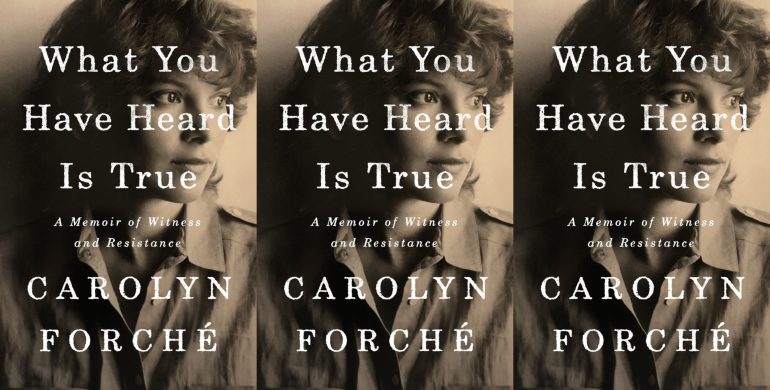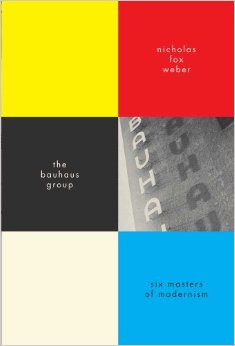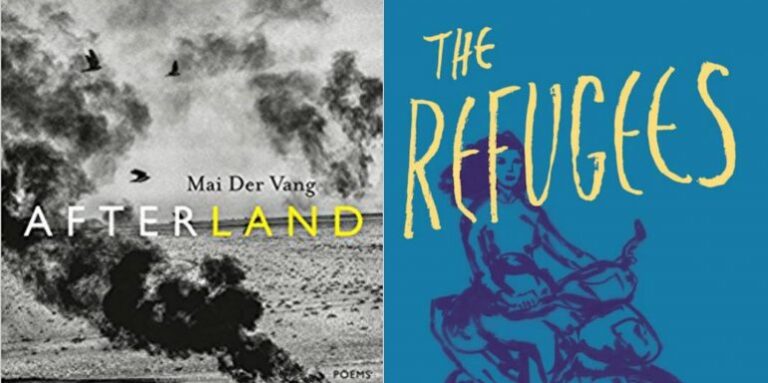“Poetry has great work to do”: An Interview with Carolyn Forché
 One day when Carolyn Forché was in her twenties, a man she had never met arrived at her house with two young girls, a beat-up truck, and pages of documents concerning the history of the US government and El Salvador. This man, Leonel Gómez Vides, would alter the course of Forché’s life. In her recent memoir, What You Have Heard Is True—her first published work of prose—Forché recounts the experiences that this meeting led her to witness in El Salvador in the late 1970s, just before the country was consumed by civil war.
One day when Carolyn Forché was in her twenties, a man she had never met arrived at her house with two young girls, a beat-up truck, and pages of documents concerning the history of the US government and El Salvador. This man, Leonel Gómez Vides, would alter the course of Forché’s life. In her recent memoir, What You Have Heard Is True—her first published work of prose—Forché recounts the experiences that this meeting led her to witness in El Salvador in the late 1970s, just before the country was consumed by civil war.
When Leonel Gómez arrived at Forché’s door, she was living a studious life in southern California, teaching writing at a university. She had previously spent a summer in Mallorca translating the work of Nicaraguan-Salvadoran poet Claribel Alegría, whose daughter was a friend of Forché’s. Alegría had mentioned Forché’s work to Gómez, who decided he needed someone from the US to witness what was happening in El Salvador and decided to find this poet. This lead to the first of many visits Forché made to El Salvador between 1978 and 1980. While she wrote some articles about her time there, the poems in her 1981 collection, The Country Between Us, relate the violence and the normalization of cruelty that she witnessed in obliquely crushing, brutal language.
What You Have Heard Is True recounts the people and situations Forché encountered in towns, neighborhoods, mountain villages, and rural hospitals all over the country; Gómez takes her along with him as he talks with everyone from farmers to military officers, ambassadors to informants. As the violence intensifies, she relies on excerpts pulled from her notebooks at the time to capture the imagery, sensations, and palpable tension—perhaps most apparent in what goes unsaid. Some of these images are echoed in the language of her poems on El Salvador, such as those in The Colonel.
In 1993, Forché edited an anthology of poems, Against Forgetting: Twentieth-Century Poetry of Witness, which brought together her interests in human rights and poetry. The 145 works in the collection come from poets around the world who had “endured conditions of historical and social extremity during the twentieth century.” These poems were to be read within the context of a term that Forché coined in the collection’s introduction, “poetry of witness.”
Poetry of witness is not political or partisan, it is a testament to the truth. It is a witnessing of violence and a documentation of the human reaction to this violence. Forché writes in the introduction to this anthology that “these poems bear a trace of extremity within them, and they are, as such, evidence of what occurred.”
I recently spoke with Forché about the distinct ways in which journalism and poetry interact with violence and how each can be utilized to record acts against humanity—as a form of witness.
Claire Mullen: In What You Have Heard Is True, you delve into the complicated relationship between writing and personal experience. In journalism, it is antithetical to include your own experience in a story because it can indicate bias, whereas poems are often about the very personal. How do you think about the delineation between journalism and poetry in response to violence, and what was your experience with this in El Salvador?
Carolyn Forché: Back then, I wrote for the Nation, the Progressive, and others, but I very happily abandoned that. I am not a journalist or a historian. I was rather free to be a literary writer and a poet and to write about my own experience because I wasn’t constricted by journalistic conventions.
There’s a frustration for journalists that they can’t speak about their experiences easily in their reporting. What I’ve noticed is that many journalists do their reporting, and then they will write a memoir or nonfiction book about their experience. For example, the great wonderful woman photographer Jean-Marie Simon who photographed throughout the War in Guatemala, and also the genocide in Guatemala, is now working on a memoir about her own experience. One of the most impressive journalists of the twentieth century, the Polish journalist Ryszard Kapuscinski, drew a line between his reporting and his own investigation of the world, as he put it, “on foot.”
These people have been great models for me, and it corresponds in some ways to the division between my poetry and this memoir. In the nonfiction memoir, I’m actually telling a story, and I’m trying to shape that story and structure it. I hadn’t written prose for years, and it was a challenge for me. It’s a different mind. We write from within a different consciousness when we’re writing nonfiction prose and poetry. When I’m writing poetry, I work with the associational mind; I’m not always completely conscious of what I’m doing. I would say that is less so when I was writing the nonfiction book because that was a retrieval from memory.
CM: In the memoir, you include sections which seem to be excerpts from your notebooks from the time you were in El Salvador, and the writing verges on stream of consciousness. Some of these excerpts include sketches of ideas or imagery that are echoed in poems in The Country Between Us. Could you describe your writing process and how these excerpts relate to your finished poems?
CF: In my adulthood as a poet, I’ve always carried small notebooks with me wherever I’ve gone. I don’t chronicle my life in them, I simply write down things as I think of them. Sometimes it’ll be a line, or a list of words, or an image that I see and I take a note of it. I’m very interested in the fact that a lot of poets that I have researched, living and dead, also kept such notebooks. It seems to be a pattern with poets.
When I was in El Salvador, I wasn’t writing poetry very much. There are only seven poems in The Country Between Us that have to do with El Salvador, and most of them were written during periods when I was back in the United States. It was very intense there. There was a great deal of fear in the air, and that isn’t conducive to writing poetry. I was writing as fast as I could just to get things down before they drifted away and when I had the peace of mind or clarity to write them. They were my escape, so there are these many, many notebooks, and those passages came from them.
One thing that I’ve noticed is that very often when I’m writing a poem, I have the feeling that I’ve written it before. When I go back to the notebooks, I often find the vocabulary of the poem or several lines that indeed I did write before. So the seeds of the first drafts are often in the notebooks. Again, not recording my life events, but rather whatever comes from my consciousness.
CM: Is this what you would describe as the associational thinking that you experience when writing poetry?
CF: Yes. Sometimes it’ll take shape and sometimes it’s all fragmented. It’s a useful practice because it allows me to maintain the connection between the pen and the mind so that I can be surprised by what happens and make discoveries through the language itself, rather than pre-conceiving what I want to say or write. I don’t think that poetry at its best comes from preconceived message or ideas. It’s not intentional in that way.
Learning to write the memoir was a process in itself. I wrote more as a poet writes, polishing every sentence. I had a difficult time moving forward, and I also had a difficult time learning how to focus on one slice of my life. A memoir is not an autobiography, so there are many parts of life that have to be left out or just skipped over, because what you’re trying to do is tell a story that may move through time.
Also, I decided that I wanted the reader not to know more than what I knew at the time. I tried to take the reader with me on the journey that I took. I wanted to see if I could replicate it. Rather than have extensive retrospection and analysis throughout, I allowed the story to unfold without interference. Once I made that decision, I also made the discovery that inserting the excerpted passages would help me to tell the story as it happened. I could include them and it would add a dimension of a different kind of language, the kind of writing that happens under stress, and under trauma, and it’s very different, as you noticed.
CM: Throughout the memoir, it is clear that you as a narrator are learning, you’re growing and becoming someone else. It’s fascinating that that was a deliberate choice on your part to make the reader learn along with the narrator.
CF: Well, thank you. What I wanted to do was to write a transformative memoir.
Many American memoirs will have a narrator who endures some kind of adversity, passes through adversity, and somehow either triumphs over it or comes to terms with it, and then has something to offer in terms of realizations and wisdom at the end. My memoir does not satisfy those things. I don’t triumph over adversity, and I don’t offer in explicit terms what I took from it. What I wanted to do was replicate what happened so that other people would understand what happened, they would go through it in a certain way.
I wanted a consciousness shift from the beginning to the end as my consciousness shifted. I wanted to see if I could produce a text that would do that.
CM: Yes, at one point you even specifically say that you left behind your former self in a neighborhood called La Fosa.
CF: Yes, La Fosa is the word for grave, and that was the name of the barrio. That is where I destabilized my US formation, de-centered it. It was my transformative moment, or it’s the one my memory chooses as the transformative moment. There were probably many, but that night I was conscious of changing within myself.
CM: Can you describe that moment?
CF: I’m not sure I could. You know something has happened to you, and you know you will understand it later. You also know that you won’t make the same decisions you made earlier any longer. I knew that I wasn’t going to be concerning myself with certain things anymore, that those had fallen away. Like having to rest, and having to be comforted when things were bad.
Our country has been the most warlike country since its birth. We’ve had only sixteen years of peace in our nation’s history. In America, we grow up not really understanding that. We don’t see ourselves as we are seen. I think we’re not really formed to regard other human beings as the same as ourselves, fully the same as ourselves. There’s a kind of exceptionalism.
It’s very difficult to get outside of the formation that one receives here. I’m not trying to be pejorative in this argument. I’m simply saying that I have noticed this difficulty. This rigid formation. We don’t imagine that things can be otherwise.
CM: In situations of conflict and crisis, what do you think is the role of poetry?
CF: During situations of deep crisis people do tend to turn to poetry. For example, in the immediate aftermath of 9/11, people turned to the poem “September 1, 1939” by W.H. Auden. That was played on the radio repeatedly during that time.
Poetry tells a different story than history does. Poetry, I think, records the human soul’s response to history. Just as the historian attempts to assemble the facts of what happened and give them a shape or a narrative, I believe that poetry is the history of the soul in these times. It’s the record of the journey of the human soul and how it responds.
So the role is to be present. The role is to stay in the language. The role is to write, and what emerges will be mosaic chips of the human response. They will fill a larger mosaic, which many poets contribute to. So, is poetry useful? Poetry, I believe, is something deep, ancient, and sacred. It doesn’t have to be useful. Poetry is the spirit of the language.
When we think of the question of the writers’ responsibility to the state and society, I think we have the same responsibilities that all citizens have. There’s nothing special about that. But the degree to which we have poetic gifts and give them back, I think they are a blessing on society.
Poetry has great work to do. We may not make it, but I think it’s important to write nevertheless. We have to hope even if we believe that we may not make it. Nothing is guaranteed.


